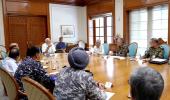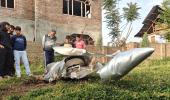India has inflicted tremendous losses to the Pakistan military, including downing a few of its fighter jets featuring latest technologies and damaging key military installations close to even capital Islamabad, during the three-day confrontation between the two sides, the Indian military said on Sunday.

Director General of Military Operations (DGMO) Lt Gen Rajiv Ghai said 35-40 Pakistani military personnel were killed in the combat and New Delhi achieved its desired objectives and that Pakistan will have to pay a very heavy price if it resorts to any more misadventure.
The Indian military also acknowledged suffering some losses but declined to provide the details as the operations are going on.
"We are in a combat scenario. Losses are a part of combat. The question to be asked is, have we achieved our objectives of decimating the terrorist camps? The answer is a thumping yes," Director General Air Operations Air Marshal AK Bharti said at a media briefing here.
"All I can say is that we have achieved our objectives that we selected and all our pilots are back home," he said.
The officer was asked about reports in the foreign media about losses of Indian fighter jets.
Senior military officials of the Army, Indian Air Force and the Indian Navy provided details at the media briefing on Operation Sindoor, including how India repelled Pakistani attempts to target Indian military installations and civilian areas.
Lt Gen Ghai said over 100 terrorists, including high-value targets such as Yusuf Azhar, Abdul Malik Rauf and Mudasir Ahmed who were involved in the hijacking of IC-814 and the Pulwama blast, were eliminated during Operation Sindoor early on May 7.
To a question, Air Marshal Bharti said India definitely downed a few Pakistani planes but refused to hazard a guess on the numbers.
"Their planes were prevented from coming inside our border. So we do not have the wreckage with us but definitely we have downed a few planes," he said.
DGMO Lt Gen Ghai also paid tribute to five Indian fallen heroes and civilians who "tragically lost their lives" during Operation Sindoor.
"We have thus far exercised immense restraint and our actions have been focused, measured and non-escalatory. However, any threat to the sovereignty, territorial integrity and safety of our citizens will be met with decisive force," he said.
On losses to the Pakistani military, the DGMO said there are reports of 35-40 fatalities.
The DGMO said it was his Pakistani counterpart who made a call to him on Saturday afternoon, requesting a way out to stop the hostilities.
The two DGMOs agreed to stop all firing and military action on land and in the air and sea with effect from 1700 hours Indian Standard Time.
The Indian military suggested that the Pakistani DGMO's call came after Indian armed forces launched a fierce counter-attack on several Pakistani military installations, including Rafiqui, Murid, Chaklala, Rahim Yar Khan, Sukkur and Chunian, on Saturday morning.
The strikes were launched after the Pakistan military attempted to target major Indian military installations on the night of May 9-10.
Nine terror targets were identified after careful deliberations and they were hit using precision weapons, Lt Gen Ghai said.
Operation Sindoor was launched early on May 7 to destroy nine terror infrastructures in Pakistan and Pakistan-occupied Kashmir (PoK) in retaliation to the Pahalgam terror attack. All subsequent retaliations to Pakistani offensives were carried out under Operation Sindoor.
Lt Gen Ghai said Operation Sindoor was conceptualised with a clear military aim to punish the perpetrators and planners of terrorist strikes.
"It set into motion a very diligent and microscopic scouring of the terror landscape across the borders and the identification of terror camps and training sites," he said.
Director General of Naval Operations Vice Admiral AN Pramod said Indian Navy's carrier battle group, submarines and aviation assets were immediately deployed at sea with full combat readiness in the aftermath of the Pahalgam attack.
The naval forces remained forward deployed in the northern Arabian sea in a "dissuasive and deterrent" posture, with full readiness to strike select targets at sea, and on land, including Karachi, at a time of their choosing.
Vice Admiral Pramod said the forward deployment of the Indian Navy compelled Pakistani naval and air units to be in a defensive posture, mostly inside harbours or very close to their coast.
"The Indian Navy maintained seamless maritime domain awareness throughout the duration and was entirely aware of the location and movement of Pakistani units," he said.
"In effect, we had, and continue to have, good battlespace transparency, using our maritime domain awareness grid," he said.









